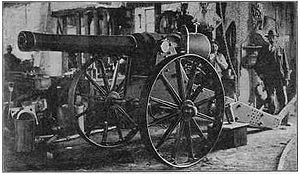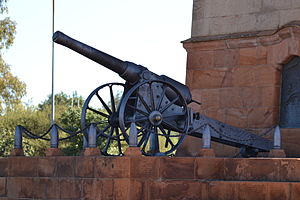Long Cecil
| Long Cecil | |
|---|---|
 
|
|
| Type | Howitzer |
| Place of origin | Kimberley |
| Service history | |
| In service | 1900-01-23 to 1900-02-15 |
| Used by | British Empire |
| Wars | Second Boer War |
| Production history | |
| Designer | George Labram |
| Designed | 1899 |
| Manufacturer | De Beers |
| Produced | January 1900 |
| No. built | 1 |
| Specifications | |
| Weight | 1,625 kilograms (3,583 lb) |
|
|
|
| Shell | 13.5 kilograms (29.8 lb) |
| Calibre | 104 millimetres (4.1 in) |
| Carriage | Custom |
| Elevation | 0° to +26° |
| Traverse | nil |
| Muzzle velocity | 512 metres per second (1,680 ft/s) |
| Effective firing range | 7,300 metres (8,000 yd) |
Long Cecil is a unique one-off gun, designed by George Labram, an American citizen, and built in the workshops of the De Beers mining company in Kimberley for use by the British during the Siege of Kimberley in the Second Boer War.
In 1902, during Cecil Rhodes' funeral procession in Cape Town, his coffin was carried on top of the Long Cecil carriage. Today the gun is located on the stylobate (facing the Free State) of the Honoured Dead Memorial in Kimberley.
At some time before 1915 Pratt & Whitney built a model of this gun as a gift to the American Society of Mechanical Engineers.
The defenders at Kimberley had only the relatively small RML 2.5 inch Mountain Gun at their disposal and therefore lacked a weapon that could effectively match those fielded by the surrounding Boers.
Labram and Edward Goffe, Chief Draughtsman at the mine, reviewed the limited number of textbooks and publications on gunmaking that were available in Kimberley. From this and calculations on what it would require to build a gun capable of firing a shell over 7,600 metres (24,900 ft), they decided that it was feasible to build the gun with the materials at hand.
Construction of the gun began on 26 December 1899 with rough-turning of the barrel, but some of the tools required for rifling the barrel were not available and first had to be manufactured on site.
The barrel was constructed from a 10-foot-long (3.0 m), 10.5-inch-diameter (270 mm) billet of mild steel. The steel billet was originally ordered as a shaft for one of the De Beers workshop machines.
...
Wikipedia
